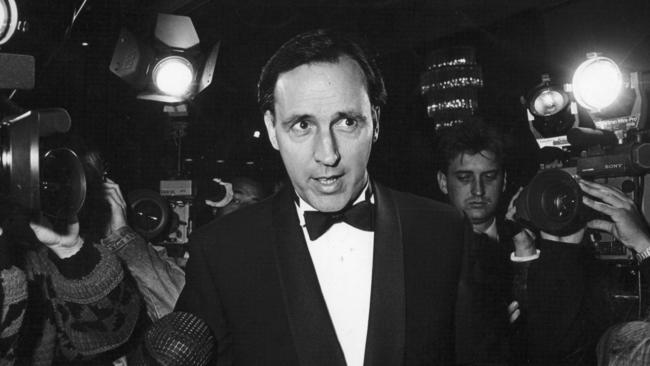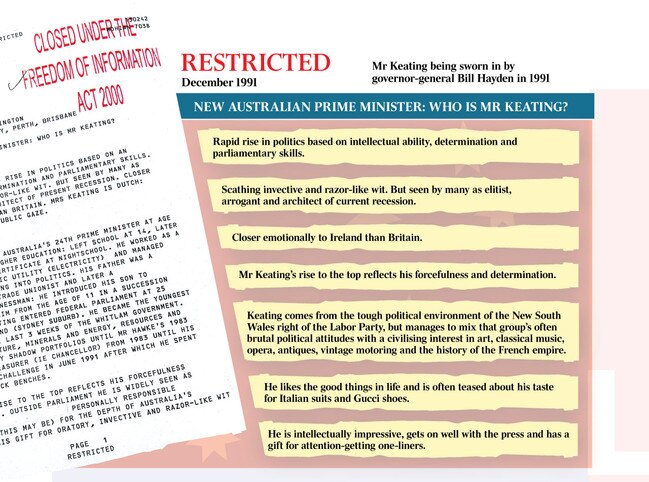Archives reveal how Paul Keating trashed and then charmed UK diplomats and officials in the 1990s
Newly declassified archives reveal diplomatic alarm at Paul Keating’s anti-British attacks and concerted efforts to rebuild relations in the 1990s.

When Paul Keating became prime minister, British diplomats described him as “intellectually impressive” with “a gift for oratory, invective and razor-like wit”, noting his brutality was leavened by highbrow cultured interests.
They also reported that Australia-UK relations had plummeted to “a new low” within months.
“Keating’s rise to the top reflects his forcefulness and determination,” a cable dispatched from Canberra to London in December 1991 reported. “Outside parliament, he is widely seen as personally responsible (however unjust this may be) for the depth of Australia’s recession.
“Keating comes from the tough political environment of the NSW Right of the Labor Party but manages to mix that group’s often brutal political attitudes with a civilising interest in art, classical music, opera, antiques, vintage motoring and the history of the French Empire. He loves the good things in life.”
A trove of recently declassified files made available to The Weekend Australian at the UK National Archives in Kew, outside London, reveals Mr Keating’s criticism of Britain’s failure to defend Singapore and resisting the return of Australian troops from the Middle East and Burma during World War II, and joining the Common Market in 1973, stung British officials.
“Media assertions that Mr Keating’s remarks and the reactions to them have brought bilateral relations to a new low have left a bad taste in many mouths, and if Britain’s substantial interests in Australia are not to be put at risk, some action to restore the situation seems (needed),” UK high commissioner Brian Barder wrote.
When Sir Brian met Mr Keating the following month, the prime minister said his comments were “aimed at his political opponents” and their “out-of-date” view of Australia’s identity and global role.
He said he was not “belittling Britain or the importance of Australia’s relations with Britain” but Sir Brian lamented to London that there was “no hint of regret over the aspersions he has been casting on Britain”.

John Major was briefed by Downing Street staff that Britain had “taken for granted” the relationship with Australia but it had been “reinvigorated and modernised” in recent years by Bob Hawke and Margaret Thatcher.
Officials conceded Mr Keating would continue to “revert to Pommy bashing if he judges it politically expedient”.
The initial concern among British diplomats in Canberra and bureaucrats in London extended to the House of Commons, with Alf Morris, a former Labour minister, urging Sir John to visit Australia and urgently work to repair relations. In June 1992, Morris told Sir John that Mr Keating’s comments about World War II could “sour relations”.
Number 10 conceded the “Keating factor” had “spoilt” the “atmosphere” of relations.
Mr Keating met Sir John in September 1993 and June 1994 in London. Within 18 months of Mr Keating becoming prime minister, the UK high commission and the Foreign and Commonwealth offices boasted that relations with Australia were now “excellent”, with “uninhibited consultation at all levels and over a wide range of international issues”.
Mr Keating had impressed and charmed diplomats.
A cable from Sir Brian in May 1994 noted that Mr Keating also thought “relations were as close and friendly as they had been for many years”. A range of policy issues concerning defence, foreign policy, pensions and compensation for British nuclear testing at Maralinga were being satisfactorily resolved.
By December 1995, just months before Mr Keating lost re-election, British diplomats viewed him as having a dual reputation for “vision” and ”arrogance,” reported high commissioner Roger Carrick. The bilateral relationship was described as one of “enormous depth by family, cultural and commercial measures” but one that also needed “extra-attentive effort” as the government’s campaign for a republic and British support for French nuclear testing in the Pacific presented key challenges.
A later profile of Mr Keating, written in 1994, was more nuanced. It described his NSW Labor Right faction “as akin to the mafia” but with “broadly centrist and pragmatic views”. The then re-elected prime minister was characterised as having “the political instincts of a street fighter” who was “respected rather than liked” by Australians and in private was “charming, witty, fluent and master of the subject.”
Mr Keating got on well with Sir John, a former chancellor, and wrote to congratulate him on becoming British prime minister in November 1990, just six months before he challenged Hawke.
“Perhaps more than most, chancellors know the value of policy structure and discipline,” Mr Keating wrote. “Can I also say from a personal standpoint, it is a good thing for a finance minister to make the grade.”
Troy Bramston is the author of Paul Keating: The Big Picture Leader (Scribe)
Monday: how the UK responded to Keating’s republic push


To join the conversation, please log in. Don't have an account? Register
Join the conversation, you are commenting as Logout